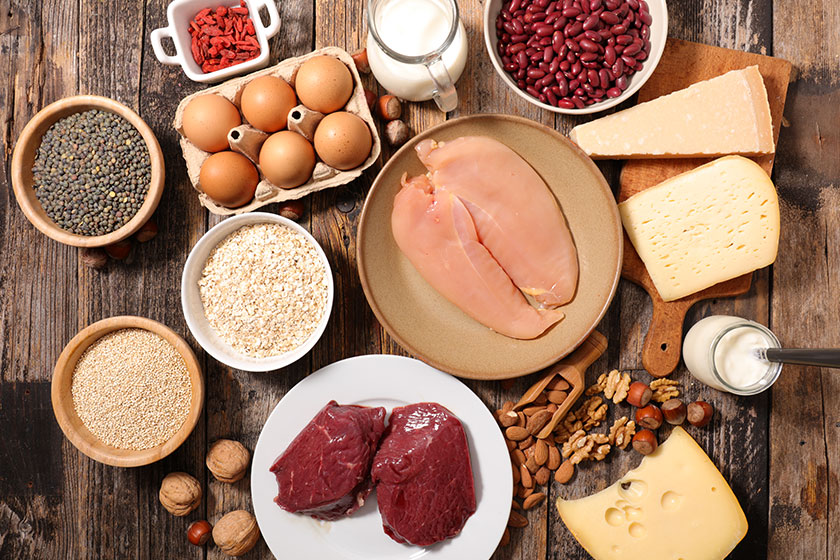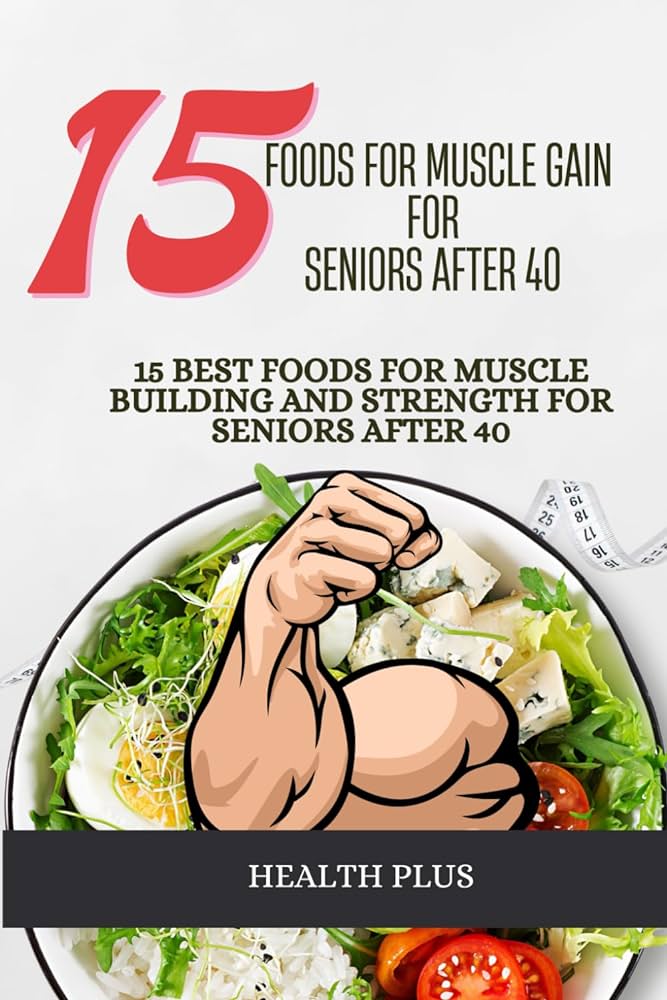Are you curious about what foods can help older adults build muscle and combat Sarcopenia? Look no further! In this article, we will explore the top food choices that can contribute to muscle growth in seniors. As we age, our muscles naturally deteriorate, but by incorporating specific nutrients into our diet, we can slow down this process and maintain and strengthen our muscles. So, if you’re interested in learning about the best foods to include in your meals to promote muscle health, keep reading!

This image is property of s11727.pcdn.co.
Protein-rich Foods
Protein is a crucial nutrient when it comes to building and repairing muscles, and as a senior, it becomes even more important to ensure you’re getting an adequate amount. Lean meats are an excellent source of protein and are low in fat. Options such as skinless chicken breast, turkey breast, and lean cuts of beef or pork can provide a significant amount of protein without adding excessive saturated fats to your diet.
Fish is another protein-rich food that seniors can incorporate into their meals. Fatty fish like salmon, tuna, and mackerel not only offer a good amount of protein but are also rich in omega-3 fatty acids, which have numerous health benefits. These fatty acids can help reduce inflammation, improve heart health, and support brain function.
Eggs are a versatile and inexpensive source of protein. They contain all essential amino acids, making them a complete protein source. Consuming eggs can help promote muscle protein synthesis, which is vital for building and maintaining muscle mass.
Dairy products are also rich in protein and offer additional benefits due to their calcium content, which we will discuss further later. Options like Greek yogurt, cottage cheese, and milk can be excellent choices to boost your protein intake while also providing essential vitamins and minerals.
Plant-based protein sources can be a great addition to any diet, whether you choose to follow a vegetarian or vegan lifestyle or simply want to incorporate more plant-based foods into your meals. Legumes, such as beans and lentils, are high in protein and fiber, making them a filling and nutritious option. Additionally, tofu, tempeh, and edamame are all excellent plant-based protein sources.
Healthy Fats
While it’s important to watch your fat intake, it’s equally important to include healthy fats in your diet. Healthy fats provide energy, support brain function, and aid in the absorption of fat-soluble vitamins. Avocados are a great source of healthy fats and also provide fiber, vitamins, and minerals. Adding slices of avocado to salads, sandwiches, or incorporating them into smoothies can help boost your healthy fat intake.
Nuts and seeds also contain healthy fats, along with other beneficial nutrients. Walnuts, almonds, chia seeds, and flaxseeds are all excellent options to include in your diet. These can be added to meals, snacks, or used as toppings for dishes like yogurt or oatmeal.
Olive oil is a staple in the Mediterranean diet and is rich in monounsaturated fats, which are considered heart-healthy fats. It can be used for cooking, drizzled over salads, or used as a dip for bread. Coconut oil is another option, although it is higher in saturated fats, so it should be consumed in moderation. It can be used for cooking and baking, and some people even use it in their coffee or smoothies.
Complex Carbohydrates
Carbohydrates are an essential source of energy, and as a senior, it’s important to choose complex carbohydrates over simple ones. Whole grains, such as brown rice, quinoa, and whole wheat bread, provide more fiber and nutrients compared to refined grains. They can help you feel fuller for longer and provide a sustained release of energy.
Legumes, which were mentioned earlier as a source of protein, are also excellent sources of complex carbohydrates. Options like lentils, chickpeas, and black beans provide a good amount of fiber and can be included in soups, stews, or salads.
Sweet potatoes are not only a delicious and versatile vegetable but are also packed with complex carbohydrates. They are a great source of vitamins A and C, as well as fiber. Whether roasted, mashed, or incorporated into recipes like sweet potato fries or casseroles, this root vegetable can be a nutritious addition to your meals.
Quinoa is a unique grain because it contains all nine essential amino acids, making it a complete protein source. It also provides complex carbohydrates and fiber, making it a perfect addition to salads, stir-fries, or as a side dish with your favorite protein.
Vitamin D-rich Foods
Vitamin D plays a crucial role in muscle function and overall health. Unfortunately, as we age, our bodies may become less efficient at producing vitamin D from sunlight. Including vitamin D-rich foods in your diet can help ensure you’re meeting your daily needs.
Fatty fish, such as salmon, trout, and sardines, are excellent sources of vitamin D. These fish not only provide protein and healthy fats but also contribute to your vitamin D intake. Including fish in your diet a few times a week can be a great way to maintain adequate levels of this essential vitamin.
Eggs, which were mentioned earlier as a protein-rich food, also contain vitamin D. Incorporating eggs into your meals or enjoying them as a standalone dish can help boost your vitamin D intake.
Mushrooms can be an excellent addition to your diet, particularly if you’re following a vegetarian or vegan lifestyle. Some varieties of mushrooms, such as shiitake and maitake, naturally contain vitamin D. Exposing mushrooms to sunlight for a short period before consuming them can increase their vitamin D content even further.
Fortified foods, including certain cereals, milk alternatives, and orange juice, can also provide a good amount of vitamin D. Checking labels and choosing products that have been specifically fortified with vitamin D can be a convenient way to ensure you’re meeting your daily requirements.

This image is property of www.moradaseniorliving.com.
Calcium-rich Foods
Calcium is not only essential for bone health but is also important for muscle function. Including calcium-rich foods in your diet can help support muscle strength and prevent age-related muscle loss.
Dairy products, such as milk, yogurt, and cheese, are well-known sources of calcium. They also provide protein and other essential nutrients. Opting for low-fat or non-fat dairy products can help reduce your overall intake of saturated fats.
Leafy green vegetables, like spinach, kale, and collard greens, are loaded with calcium and other micronutrients. Incorporating these vegetables into salads, smoothies, or cooked dishes can help boost your calcium intake.
Sardines are tiny fish that are also packed with calcium. They can be enjoyed as a standalone dish or added to salads, pasta, or sauces for an extra calcium-boost.
Fortified plant-based milks, such as almond milk or soy milk, can be excellent alternatives for individuals who cannot or choose not to consume dairy products. These milk alternatives are often fortified with calcium and other essential nutrients, making them a suitable option for maintaining calcium intake.
Antioxidant-rich Foods
Antioxidants play a crucial role in reducing oxidative stress and inflammation in the body. Including antioxidant-rich foods in your diet can help support overall health, including muscle health.
Berries, such as blueberries, strawberries, and raspberries, are packed with antioxidants. They are also low in calories and high in fiber, making them a perfect choice for a nutritious snack or addition to meals. Enjoying a bowl of mixed berries with Greek yogurt or adding them to smoothies can be a delicious and nutritious treat.
Colorful fruits and vegetables, such as oranges, tomatoes, bell peppers, and leafy greens, all contain a variety of antioxidants. These fruits and vegetables provide not only antioxidants but also vitamins, minerals, and fiber. Including a variety of colorful produce in your meals ensures a wide range of antioxidants and other beneficial compounds.
Nuts, such as almonds, walnuts, and pecans, also offer antioxidant properties. They are also rich in healthy fats and provide a good amount of protein and fiber. Snacking on a handful of nuts or adding them to salads or homemade trail mix can offer a nutritious and antioxidant-rich option.
Green tea is known for its beneficial properties and is a great source of antioxidants. Enjoying a cup of green tea in the morning or throughout the day can provide a refreshing and health-promoting beverage.

This image is property of www.inspiredliving.care.
Hydration
Staying properly hydrated is crucial for overall health and well-being. It’s especially important for seniors to pay attention to their hydration status, as dehydration can have more severe consequences in older adults. While water is the most obvious and essential source of hydration, there are other options to keep you hydrated and add variety to your beverage choices.
Herbal teas, such as chamomile, peppermint, or ginger tea, can provide hydration while also offering additional health benefits. These teas are often caffeine-free and can be enjoyed hot or cold.
Fruit-infused water is another great way to stay hydrated while adding flavor. Simply add slices of your favorite fruits, such as lemon, lime, or berries, to a pitcher of water and let it infuse for a few hours or overnight. This creates a refreshing beverage without any added sugars or artificial ingredients.
Pre- and Post-Workout Foods
If you’re engaging in regular exercise or physical activity, it’s important to fuel your body properly before and after your workouts. This can help optimize your performance, aid in recovery, and support muscle growth and maintenance.
Bananas are an excellent pre-workout snack due to their natural sugars and easily digestible carbohydrates. They provide a quick source of energy that can help fuel your workouts. Additionally, bananas contain potassium, which is essential for proper muscle function.
Greek yogurt is a versatile and protein-rich option for a pre- or post-workout snack. It provides a good amount of protein, which is crucial for muscle recovery and growth. It can be enjoyed plain or with added fruits and nuts for added flavor and nutrients.
Turkey or chicken breast are lean protein sources that can be incorporated into pre- or post-workout meals. They provide essential amino acids that contribute to muscle repair and growth. Enjoying a turkey or chicken breast wrap, salad, or stir-fry can make for a satisfying and nutritious meal.
Protein shakes, which can be made with whey protein powder or plant-based protein powders, provide a convenient and quick source of protein. They can be consumed before or after a workout and can help support muscle recovery and growth. Adding fruits, vegetables, or nut butter to your protein shakes can enhance the nutrient content and flavor.

This image is property of Amazon.com.
Supplements
While it’s best to get most nutrients from whole foods, there may be situations where incorporating supplements can be beneficial. Supplements should be used to complement a balanced diet and not replace food sources.
Whey protein powder is a popular choice for individuals looking to increase their protein intake. It is easily absorbed by the body and can be mixed with water, milk, or added to smoothies. Whey protein powder can be especially useful for seniors who may have difficulty consuming enough protein through regular food sources.
Creatine is a supplement that has been extensively studied and shown to have numerous benefits for muscle health and physical performance. It can help enhance muscle strength and power, particularly during high-intensity exercises. Creatine is commonly available in powder or capsule form.
Branched-chain amino acids (BCAAs) are a group of essential amino acids that can be taken in supplement form. BCAAs, including leucine, isoleucine, and valine, play a significant role in muscle protein synthesis and muscle recovery. They can be taken before, during, or after workouts to support muscle growth and reduce muscle soreness.
Fish oil supplements can be a useful addition to your diet, particularly if you don’t consume fish regularly. They provide omega-3 fatty acids, which have numerous health benefits, including reducing inflammation, improving heart health, and supporting brain function. Fish oil is usually available in capsule form.
Meal Timing and Portion Control
In addition to the specific food choices, meal timing and portion control can also play a role in building and maintaining muscle mass as a senior.
Eating regular meals throughout the day, including breakfast, lunch, and dinner, can help provide a steady stream of nutrients and energy throughout the day. Aim to include a variety of food groups in each meal to ensure you’re getting a balanced intake of protein, carbohydrates, and healthy fats.
When it comes to portion control, it’s important to be mindful of your serving sizes. As we age, our metabolism may slow down, and our calorie needs may decrease. Paying attention to portion sizes can help prevent overeating and ensure you’re consuming an appropriate amount of calories for your activity level and goals.
Avoiding overeating is crucial for maintaining a healthy weight and supporting muscle health. Eating until you’re comfortably full, not overly stuffed, can help prevent unnecessary weight gain. Listening to your body’s hunger and fullness cues can be a helpful strategy.
Proper timing around workouts is also important. Consuming a balanced meal or snack containing carbohydrates and protein before and after exercise can help optimize your performance and aid in muscle recovery. This can include options mentioned earlier, such as bananas, Greek yogurt, turkey or chicken breast, or protein shakes.
In conclusion, as a senior, focusing on a well-rounded diet that includes protein-rich foods, healthy fats, complex carbohydrates, vitamin D-rich foods, calcium-rich foods, antioxidant-rich foods, and staying adequately hydrated can help support muscle health. Proper meal timing, portion control, and considering supplements when necessary can further enhance your overall well-being and promote optimal muscle function. Remember to consult with a healthcare professional or registered dietitian if you have specific dietary concerns or conditions.



